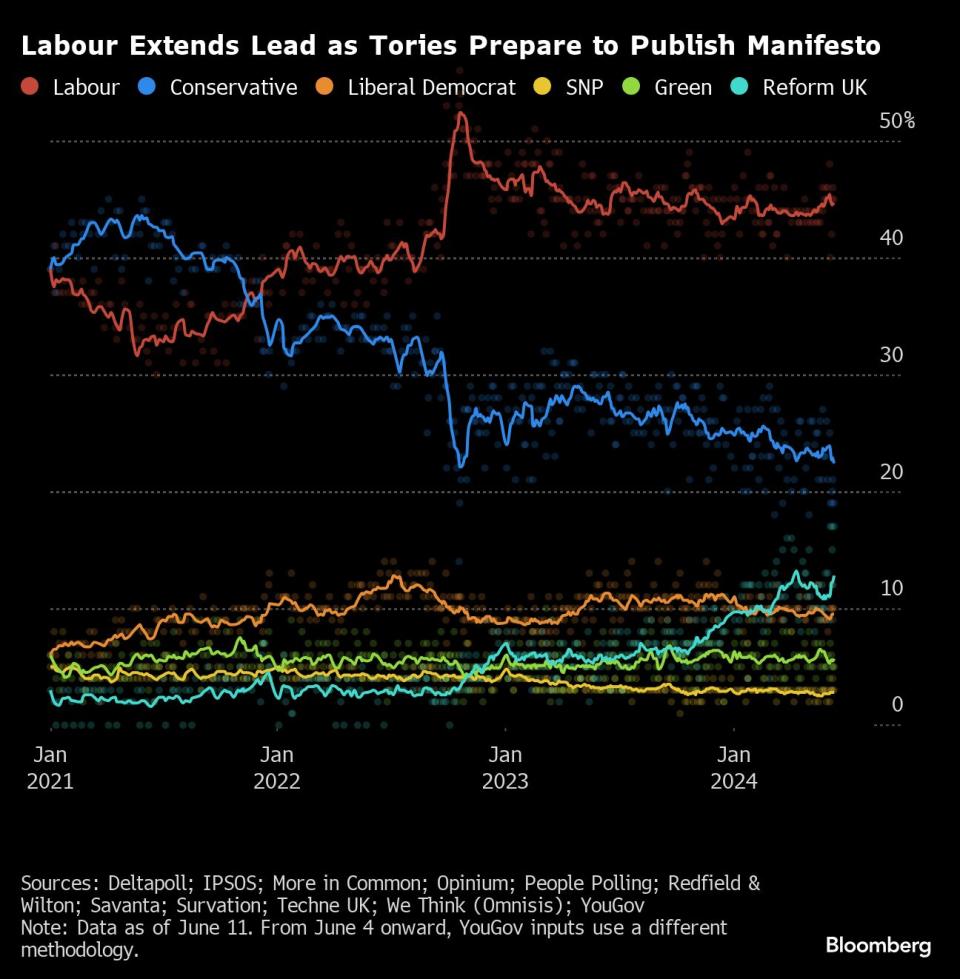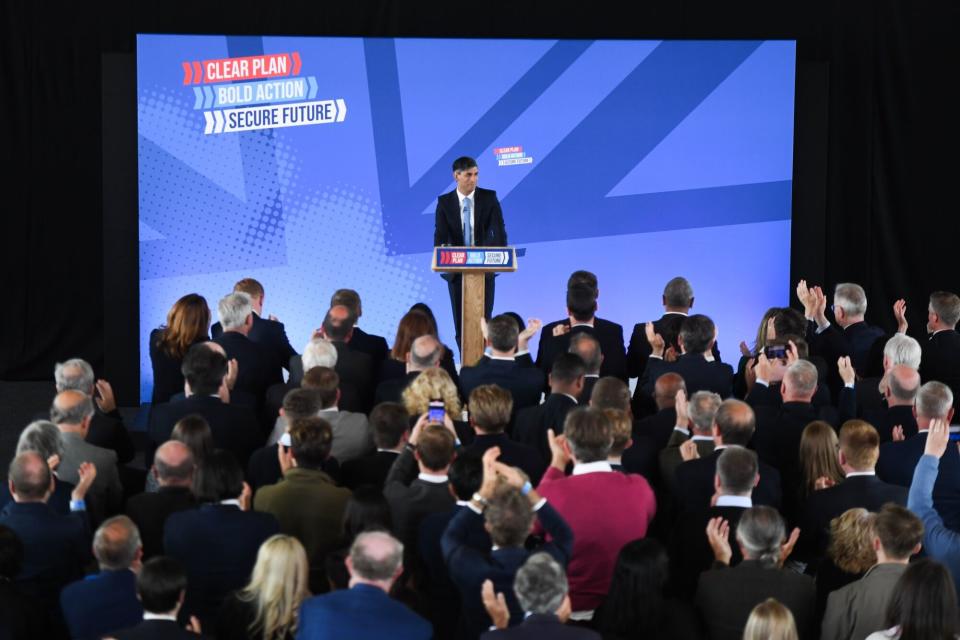Sunak Seeks to Turn Tide on Labour With Tax-Cutting Offer
(Bloomberg) -- Prime Minister Rishi Sunak put tax cuts at the center of the Conservative election manifesto as he sought to forge a dividing line with the Labour opposition and turn around his party’s fortunes in national polls ahead of the July 4 general election.
Most Read from Bloomberg
Dozens of CVS Generic Drug Recalls Expose Link to Tainted Factories
Stocks Rise as Solid Treasury Sale Spurs CPI Bets: Markets Wrap
The core policy pursued by the Tories if they win will be a 2 percentage-point cut in the national insurance payroll tax — identical to the measure deployed by Sunak’s chancellor, Jeremy Hunt, at the past two major fiscal events, with little effect on the Conservatives’ standing with the electorate.
“I’m not blind to the fact that people are frustrated with our party and frustrated with me,” Sunak said at the Silverstone motor racing circuit, where he launched the party’s manifesto on Tuesday. “Things have not always been easy, and we have not always got everything right. But we are the only party at this election with the big ideas to make our country a better place to live.”
With Keir Starmer’s opposition party enjoying a polling lead in excess of 20 points and projections putting Labour on course to its biggest ever majority, the package of measures announced by Sunak is aimed at hammering home the key Tory message that they’re the party of tax cuts while Labour will raise taxation.
But Sunak will inevitably face accusations — including from his own side — that despite the Tory slogan promising “bold action,” there is little in the manifesto that can make a difference to the polls. Indeed some ministers sought last-minute changes to the manifesto after seeing a draft last week that left them underwhelmed at its lack of game-changing measures. But Sunak said measures announced Tuesday would lower the tax burden by one percentage point a year versus official forecasts made in March. The party’s costings show tax cuts rising to £17.2 billion ($21.9 billion) a year by 2029-2030.
Other moves outlined by the Tories include abolishing the main rate of the payroll tax for self-employed workers by 2029, reiterating an ambition to eliminate national insurance altogether, and a tax guarantee for pensioners. The party said those cuts would be funded by a clampdown on tax avoidance, and measures aimed at slashing the welfare bill by £12 billion a year.
“Keir Starmer is asking you to hand him a blank check when he hasn’t said what he’ll buy with it, or how much it’s going to cost,” Sunak said. “Labour offer no solutions to our problems, they would only make things worse.”
The problem for Sunak is that first as chancellor and then as prime minister, he’s overseen a rise in the UK tax burden to its highest in 70 years — an increase he was forced to acknowledge in the BBC interview.
Moreover, the ambition to scrap national insurance plays into Labour’s argument that it’s an unfunded £46 billion pledge that would roil the markets in the same way former Tory Prime Minister Liz Truss’s so-called mini-budget did in 2022 — a package of measures that led to her premiership unraveling after 7 disastrous weeks.
Sunak and his ministers, for their part, have persistently said Labour’s policies would add more than £2,000 pounds to the typical household tax bill — a number rejected by Labour, which in any case applies to a four-year period rather than one year.
Labour, like the Tories, has promised not to increase the rates of the Treasury’s three main revenue-raisers, income tax, national insurance and value added tax.
Speaking to reporters before the Tory launch, Starmer doubled down on his assertion that his party wouldn’t raise taxes on working people, and made unfavorable comparisons between the Tories and his Labour predecessor Jeremy Corbyn, who went into the last general election with a costly offer that included nationalizing rail companies and utilities.
“They’re building a Jeremy Corbyn-style manifesto where anything you want can go in there but none of it is costed,” said Starmer — who was a member of the former leader’s top team in 2019.
On migration, Sunak said he would prioritize national security over Britain’s relationship with the European Convention on Human Rights. The manifesto pledged to “reform asylum rules” and “international laws” on migration by working with other countries — a development in the party’s position, but falling short of demands from Tory right-wingers to explicitly consider withdrawal from the agreement.
Sunak hinted he’s prepared to go further, saying if forced, “I’m going to choose our country’s national security every single time” over adherence to ECHR rulings.
Sunak also vowed to make the UK a net exporter of electricity, increasing generation by gas-fired power stations, offshore wind and small modular nuclear power plants. The party would also deliver a new full-scale nuclear power plant in North Wales and build carbon capture and storage clusters, according to the manifesto.
Other manifesto promises from the Tories, many of them already announced in the early campaign, include:
A plan to bring back compulsory national service for 18-year-olds
A guaranteed annual rise in the tax threshold for pensioners to ensure those on the basic state pension never have to pay tax
A promise not to change the number of council tax bands
A rise in the earnings threshold at which child benefits are withdrawn
Abolishing stamp duty on property purchases by first-time buyers for homes worth up to £425,000
Thirty hours of free childcare a week for working parents from when their child is nine months old
Increasing defense spending to 2.5% of economic output by 2030
Reforming the welfare system to save £12 billion a year
Scrapping university degrees deemed not to add value
A cap on immigration, and implementation of a government plan to deport asylum-seekers to Rwanda
Banning the use of mobile phones by children during the school day
Recruiting 92,000 more nurses, 28,000 more doctors and 8,000 more police officers
The construction of 1.6 million new homes over the five years of the next Parliament
The tax cuts would cost the Treasury £61.9 billion over the life of the next Parliament and would be paid for by a £65 billion clampdown on welfare spending and tax avoidance, according to estimates the Conservatives included in their manifesto.
--With assistance from Helen Chandler-Wilde, Irina Anghel, Jack Ryan, Reed Landberg and Louise Moon.
(Updates with costing detail in fourth paragraph.)
Most Read from Bloomberg Businessweek
China’s Economic Powerhouse Is Feeling the Brunt of Its Slowdown
As Banking Moves Online, Branch Design Takes Cues From Starbucks
Food Companies Hope You Won’t Notice Shortages Are Raising Prices
Legacy Airlines Are Thriving With Ultracheap Fares, Crushing Budget Carriers
©2024 Bloomberg L.P.

 Yahoo News
Yahoo News 





